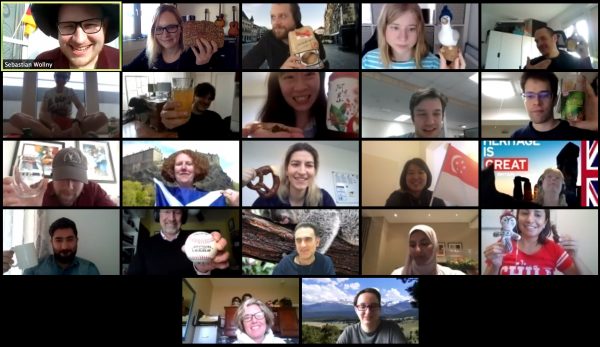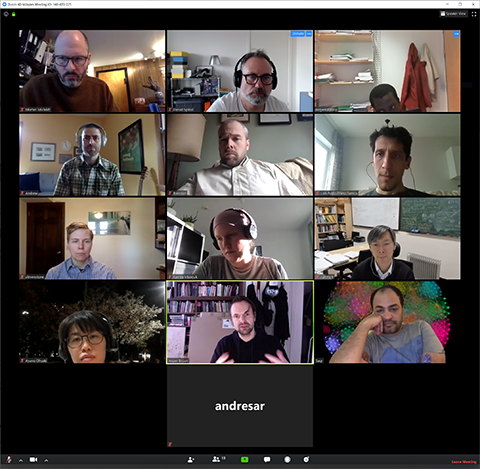The Tenth International Conference on Learning Analytics & Knowledge (LAK’20)

Frankfurt, Germany, March 23-27, 2020, #LAK20
The 2020 edition of The International Conference on Learning Analytics & Knowledge (LAK20) will take place in Frankfurt, Germany. LAK20 is organised by the Society for Learning Analytics Research (SoLAR) and hosted by Frankfurt Goethe-University in Germany with support from many European partners. LAK20 is a collaborative effort by learning analytics researchers and practitioners to celebrate and promote the achievements of the learning analytics community over the past ten years and to look forward to what lies ahead.
Conference Theme: Shaping the future of the field [Click to read the general call]
Conference Theme: Shaping the future of the field.
Call for Papers
The 2020 edition of The International Conference on Learning Analytics & Knowledge (LAK20) will take place in Frankfurt, Germany. LAK20 is organised by the Society for Learning Analytics Research (SoLAR) and hosted by Frankfurt Goethe-University in Germany with support from many European partners. LAK20 is a collaborative effort by learning analytics researchers and practitioners to celebrate and promote the achievements of the learning analytics community over the past ten years and to look forward to what lies ahead.
The tenth anniversary of the LAK conference celebrates the past successes of the learning analytics community and poses new questions and challenges for the field. The theme for this year is “Shaping the future of the field” and focuses on thinking how we can advance learning analytics and drive its development over the next ten years and beyond.
LAK conference is intended for both researchers and practitioners. We invite both researchers and practitioners of learning analytics to come and join a proactive dialogue around the future of learning analytics and its practical adoption. We further extend our invite to educators, leaders, administrators, government and industry professionals interested in the field of learning analytics and related disciplines.
If you have further questions do not hesitate to contact lakconference@gmail.com
Conference theme and topics
We welcome submissions from both research and practice, covering different theoretical, methodological, empirical and technical contributions to learning analytics field. Specifically, this year, we invite contributors to think about the implications and potential impact of the presented work for the next 10 years. In their contributions, we encourage authors to address some of the following questions:
- What are the practical and scholarly implications of the presented work for the next ten years?
- What are the challenges of the presented work we need to address to improve its impact in the next ten years?
- How can the presented work be practically implemented and adopted?
We also explicitly encourage research that validates, replicates and examines the generalisability of previously published findings, as well as the aspects of practical adoption of the existing learning analytics methods and approaches. Finally, we also invite authors to submit dedicated short research paper submissions (see below for details) that explicitly address the theme of this year’s conference.
Some of the topics of interest include, (but are not limited) are:
Capturing Learning & Teaching:
- Finding evidence of learning: Studies that identify and explain useful data for analysing, understanding and optimising learning and teaching.
- Assessing student learning: Studies that assess learning progress through the computational analysis of learner actions or artefacts.
- Analytical and methodological approaches: Studies that introduce analytical techniques, methods, and tools for capturing and modelling student learning.
- Technological infrastructures for data storage and sharing: Proposals of technical and methodological procedures to store, share and preserve learning and teaching traces.
Understanding Learning & Teaching:
- Data-informed learning theories: Proposals of new learning/teaching theories or revisions/reinterpretations of existing theories based on large-scale data analysis.
- Insights into specific learning processes: Studies to understand particular aspects of a learning/teaching process through the use of data science techniques.
- Learning and teaching modeling: Creating mathematical, statistical or computational models of a learning/teaching process, including its actors and context.
- Systematic reviews: Studies that provide a systematic and methodological synthesis of the available evidence in an area of learning analytics.
Impacting Learning & Teaching:
- Providing decision support and feedback: Studies that evaluate the impact of feedback or decision-support systems based on learning analytics (dashboards, early-alert systems, automated messages, etc.).
- Practical evaluations of learning analytics efforts: Empirical evidence about the effectiveness of learning analytics implementations or educational initiatives guided by learning analytics.
- Personalised and adaptive learning: Studies that evaluate the effectiveness and impact of adaptive technologies based on learning analytics.
Implementing change in Learning & Teaching:
- Ethical issues around learning analytics: Analysis of issues and approaches to the lawful and ethical capture and use of educational data traces; tackling unintended bias and value judgements in the selection of data and algorithms; perspectives and methods for value-sensitive, participatory design that empowers stakeholders.
- Learning analytics adoption: Discussions and evaluations of strategies to promote and embed learning analytics initiatives in educational institutions and learning organisations.
Learning analytics strategies for scalability: Discussions and evaluations of strategies to scale the capture and analysis of information at the program, institution or national level; critical reflections on organisational structures that promote analytics innovation and impact in an institution.
Keynote Speakers
 |
Professor Shane Dawson, University of South Australia, Australia Talk: Learning Analytics – A field on the verge of relevance? |
 |
Professor Milena Tsvetkova London School of Economics and Political Science, UK |
Awards
Best full paper:
Focused or stuck together: multimodal patterns reveal triads' performance in collaborative problem solving
Hana Vrzakova, Mary Jean Amon, Angela Stewart, Sidney K. D'Mello
Best short paper:
Automated Insightful Drill-Down Recommendations for Learning Analytics Dashboards
Shiva Shabaninejad, Hassan Khosravi, Marta Indulska, Pedro Isaias
Best practitioner paper:
Engaging Students as Co-Designers of Learning Analytics
Juan Pablo Sarmiento, Fabio Campos, Alyssa Wise
Event Photos


Organizing Committee
Organizing Committee:
Christoph Rensing, Technische Universität Darmstadt, GER
Hendrik Drachsler, DIPF Leibniz Institute for Research and Information in Education & University of Frankfurt, GER
Grace Lynch,Society for Learning Analytics Research, AUS
Nina Seidenberg, studiumdigitale University of Frankfurt, GER
Nicole Hoover, Society for Learning Analytics Research
Program Chairs:
Katrien Verbertm, KU Leuven, BEL
Maren Scheffel, Open University, NL
Niels Pinkwart, Humboldt-Universität zu Berlin, GER
Vitomir Kovanovic, University of South Australia, AUS
Practitioner Track:
Jocelyn Manderveld, passion4learning, NL
Bart Rienties,Open University, UK
Craig Thompson, University of British Columbia, CA
Workshop and Tutorial Chairs:
Mar Pérez-Sanagustin, Paul Sabatier University Toulouse, FR
Tobias Ley, Tallinn University, ET
Pedro J. Muñoz-Merino, Universidad Carlos III de Madrid, ES
Doctoral Consortium Chairs
Simon Buckingham-Shum, University of Technology Sydney, AUS
Marcus Specht, TU Delft & LDE Centre for Education and Learning, NL
Stephanie Teasley, University of Michigan, US
Barbara Wasson, University of Bergen, NO
Michael Brown, Iowa State University, US
Posters and Demonstrations Chairs
Jan Schneider, DIPF Leibniz Institute for Research and Information in Education, GER
Daniel Spikol, Malmö University, SE
Publicity Chairs
Yi-Shan Tsai, University of Edinburgh, UK
Daniele Di Mitiri, Open University, NL
Sponsorship chair / Website Manager
Jelena Jovanovic, University of Belgrade, RS
Tim Steuer, Technische Universität Darmstadt, GER
Proceedings Editors
Atezaz Ahmad, DIPF Leibniz Institute for Research and Information in Education, GER
Ioana Jivet, Open University, NL
